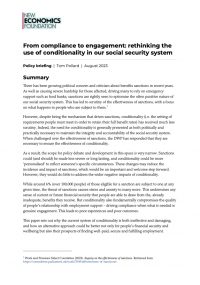From compliance to engagement
Rethinking the use of conditionality in our social security system
23 August 2023
There has been growing political concern and criticism about benefits sanctions in recent years. As well as causing severe hardship for those affected, driving many to rely on emergency support such as food banks, sanctions are rightly seen to epitomise the often punitive nature of our social security system. This has led to scrutiny of the effectiveness of sanctions, with a focus on what happens to people who are subject to them.
However, despite being the mechanism that drives sanctions, conditionality (i.e. the setting of requirements people must meet in order to retain their full benefit rates) has received much less scrutiny. Indeed, the need for conditionality is generally presented as both politically and practically necessary to maintain the integrity and accountability of the social security system. When challenged over the effectiveness of sanctions, the DWP has responded that they are necessary to ensure the effectiveness of conditionality.
As a result, the scope for policy debate and development in this space is very narrow. Sanctions could (and should) be made less severe or long lasting, and conditionality could be more ‘personalised’ to reflect someone’s specific circumstances. These changes may reduce the incidence and impact of sanctions, which would be an important and welcome step forward. However, they would do little to address the wider negative impacts of conditionality.
While around 6% (over 100,000 people) of those eligible for a sanction are subject to one at any given time, the threat of sanctions causes stress and anxiety to many more. This undermines any sense of current or future financial security that people are able to draw from the, already inadequate, benefits they receive. But conditionality also fundamentally compromises the quality of people’s relationship with employment support – driving compliance when what is needed is genuine engagement. This leads to poor experiences and poor outcomes.
This paper sets out why the current system of conditionality is both ineffective and damaging, and how an alternative approach could be better not only for people’s financial security and wellbeing but also their prospects of finding well-paid, secure and fulfilling employment.
Photo: iStock
Campaigns Living income
Topics Social security







